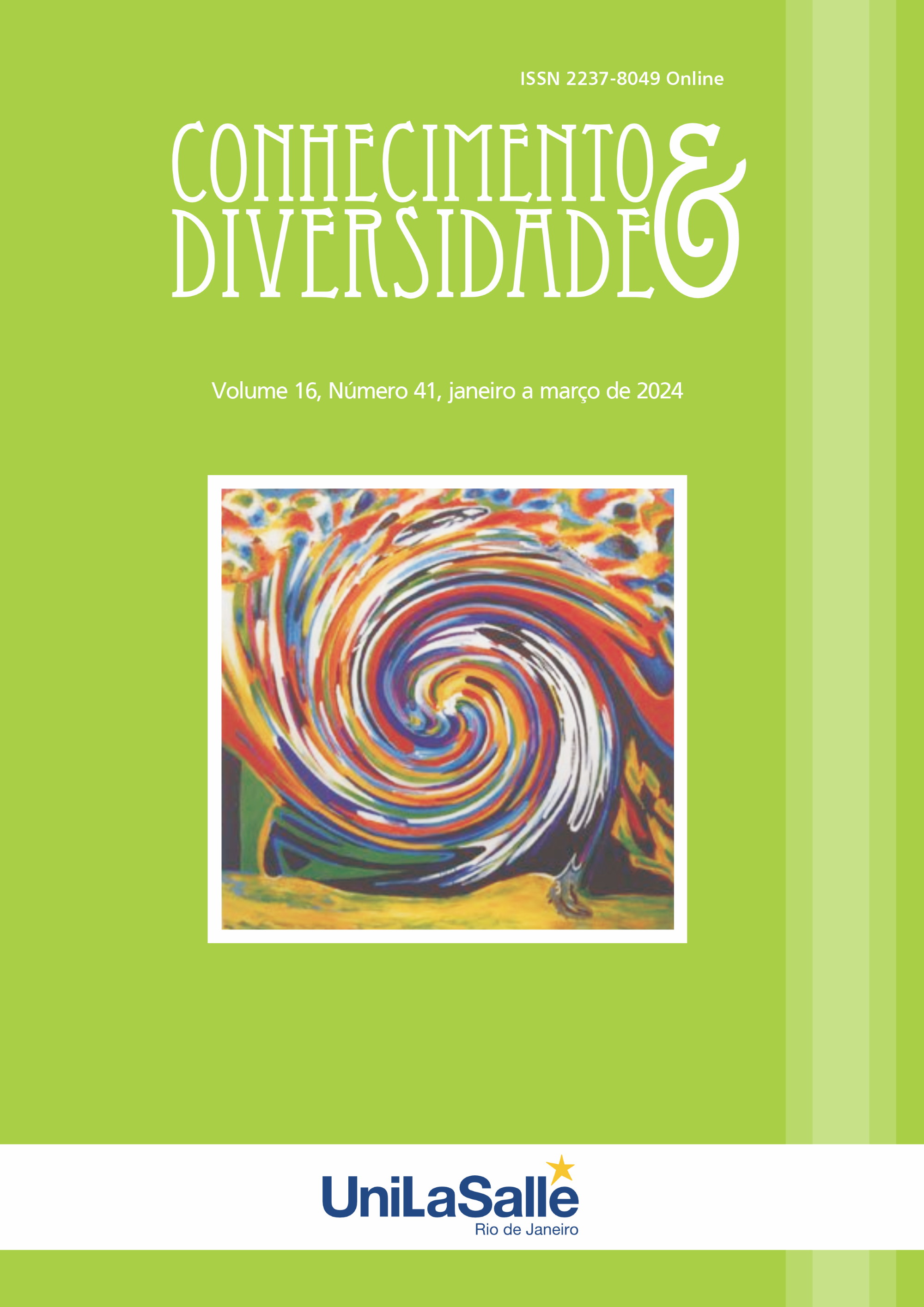O MODELO DE EDUCAÇÃO INCLUSIVA DE CRIANÇAS EM IDADE PRÉ-ESCOLAR COMO BASE PARA UMA EDUCAÇÃO SEM BARREIRAS
DOI:
https://doi.org/10.18316/rcd.v16i41.11543Palavras-chave:
Educação inclusiva, Ambiente educativo, Educação moderna, Educação pré-escolarResumo
O paradigma educativo moderno reconhece a educação pré-escolar inclusiva como um aspeto importante que requer atenção. A relevância reside no facto de se repensar a atitude da sociedade e do Estado em relação às crianças com necessidades educativas especiais, tendo em conta as mudanças na teoria e na prática pedagógicas. O artigo tem como objetivo realçar os aspectos fundamentais da educação pré-escolar inclusiva, bem como analisar as mudanças no paradigma pedagógico moderno destinadas a melhorar as condições das crianças com necessidades educativas especiais. O artigo analisa a essência da educação inclusiva, identificando aspectos-chave como a abordagem individual das crianças e a criação de condições para a sua participação igualitária em grupos conjuntos. Para tal, recorreu-se ao método da pesquisa documental e à análise do atual quadro normativo. Os autores salientam a importância da educação pré-escolar inclusiva como um passo fundamental para a criação de uma sociedade mais inclusiva e igualitária. O artigo salienta que a educação inclusiva oferece uma oportunidade para as crianças com necessidades educativas especiais se tornarem membros iguais da sociedade, reduzindo os riscos de isolamento e segregação. Os autores analisam outros aspectos da educação pré-escolar inclusiva, como a formação profissional de professores e especialistas, a organização de ambientes de desenvolvimento para crianças com diferentes necessidades e a importância das parcerias com as famílias. O artigo sublinha que a educação pré-escolar inclusiva é um passo fundamental para a criação de uma sociedade mais inclusiva e igualitária.
Referências
Akpan, V. I., Igwe, U. A., Mpamah, I. B. I., & Okoro, C. O. (2020). Social constructivism: Implications on teaching and learning. British Journal of Education, 8(8), 49–56. https://www.eajournals.org/wp-content/uploads/Social-Constructivism.pdf
Alila, K., Ukkonen-Mikkola, T., & Kangas, J. (2022). Elements of the pedagogical process in Finnish early childhood education. In H. Harju-Luukkainen, J. Kangas, & S. Garvis (Eds.), Finnish early childhood education and care: A multi-theoretical perspective on research and practice (Vol 1, pp. 195–208). Springer. https://doi.org/10.1007/978-3-030-95512-0_14
Duckworth, A. L., Kautz, T., Defnet, A., Satlof-Bedrick, E., Talamas, S., Lira, B., & Steinberg, L. (2021). Students Attending School Remotely Suffer Socially, Emotionally, and Academically. Educational Researcher, 50(7), 479–482. https://doi.org/10.3102/0013189X211031551
Gvozdikova, T., & Amandykova, D. (2023). Promoting inclusive education in Kazakhstan: Environmental and architectural aspects. ISVS e-Journal, 10(4), 201–210.
Hannigan, S., Grima-Farrell, C., & Wardman, N. (2019). Drawing on creative arts therapy approaches to enhance inclusive school cultures and student wellbeing. Issues in Educational Research, 29(3), 756–773. http://www.iier.org.au/iier29/hannigan.pdf
Hasiuk, I., Medynskyi, S., Saienko, V., Biriukova, T., Ivanikiv, N., & Yakovliv, V. (2022). Correlation of physical indices with the subjective physiological and neurophysiological parameters of health. Revista Românească pentru Educaţie Multidimensională, 14(4), 159–179. https://doi.org/10.18662/rrem/14.4/635
Humeniuk, T., & Romaniuk, P. (2023). On the development of information and communication technologies in education of the future: the possibilities of cloud computing technology. Futurity Education, 3(1), 32–41. https://doi.org/10.57125/FED.2023.25.03.03
Immordino-Yang, M. H., Darling-Hammond, L., & Krone, C. R. (2019). Nurturing nature: How brain development is inherently social and emotional, and what this means for education. Educational Psychologist, 54(3), 185–204. https://doi.org/10.1080/00461520.2019.1633924
Iskakova, M., Kaldygozova, S., Ussenova, A., Junissova, A., & Shomanbaeva, A. (2023). Towards holistic education: Synthesizing personality consciousness, emerging technologies, and philosophical considerations in education system evolution. Futurity Philosophy, 2(2), 17–29. https://doi.org/10.57125/FP.2023.06.30.02
Keleş, Ö., Uzun, N., & Yalçin, G. (2023). Barrier-free science education for visually impaired students: An activity for life cycle in plants. Science Insights Education Frontiers, 14(1), 1945–1964. https://doi.org/10.15354/sief.23.or082
Kozlova, T., Polyezhayev, Y. (2022). A Cognitive-pragmatic study of Australian English phraseology. AD ALTA: Journal of Interdisciplinary Research, 12(1), 85–93. https://doi.org/10.33543/12018593
Krymets, L. (2022). What must the education of the future be like to be really future? (Attempts of philosophical reflection). Futurity Philosophy, 1(4), 28–41. https://doi.org/10.57125/FP.2022.12.30.03
Lebona, M. (2023). Exploring the understanding of enabling environment for learners with special educational needs in rural primary schools in Lesotho. International Journal of Studies in Psychology, 3(1), 22–27.
Marie, T., & Bailey, S. (2023). Creating an inclusive community in your school through Barrier-Free Theatre. Arts Education Policy Review, 124(4), 251–258. https://doi.org/10.1080/10632913.2022.2070888
Resvani, E., Eleftherakis, T., Kalerante, E., & Kaspiri, A. (2020). Integration, social inclusion, inclusive education: Parallel support teachers’ viewpoints. International Journal of Education Humanities and Social Science, 3(6), 89–124. https://ijehss.com/uploads2020/EHS_3_201.pdf
Ridei, N. (2021). Analysis of professional competencies in the characteristics of the teacher of the future: global challenges of our time. Futurity Education, 1(1), 22–32. https://doi.org/10.57125/FED.2022.10.11.3
Sanetra, B., & Małodobry, Z. (2022). Toward a postclassical paradigm for the education of the future. Futurity Education, 2(1), 13–19. https://doi.org/10.57125/FED/2022.10.11.20
Tsekhmister, Y. (2021). The problem of pedagogical innovations and trends in the development of the educational environment. Futurity Education, 1(2), 22–30. https://doi.org/10.57125/FED/2022.10.11.16
Türkmen, H. (2023). A comparative analysis of Karplus Learning Cycle Model and Ausubel Meaningful Learning Model on children’s environmental pollution cognition. Futurity Education, 3(3), 106–129. https://doi.org/10.57125/FED.2023.09.25.06
Tytova, N., & Mereniuk, K. (2022). Digital literacy of future teachers in the realities of large-scale military aggression (Ukrainian experience). Futurity Education, 2(3), 43–54. https://doi.org/10.57125/FED/2022.10.11.33
UNESCO. (2020). Inclusion and education: All means all. https://unesdoc.unesco.org/ark:/48223/pf0000373718/PDF/373718eng.pdf.multi
UNESCO. (2021). Inclusion and education: All means all. https://unesdoc.unesco.org/ark:/48223/pf0000375490/PDF/375490eng.pdf.multi
United Nations. (1989). Convention on the rights of the child [Ratified by the resolution of Verkhovna Rada of Ukraine No. 789-XII]. https://zakon.rada.gov.ua/laws/show/995_021#Text
Wiedebusch, S., Maykus, S., Gausmann, N., & Franek, M. (2022). Interprofessional collaboration and school support in inclusive primary schools in Germany. European Journal of Special Needs Education, 37(1), 118–130. https://doi.org/10.1080/08856257.2020.1853971
Downloads
Publicado
Edição
Seção
Licença
Copyright (c) 2024 Oksana Stanichenko, Svitlana Makarenko, Olena Maksymova, Mariia Fedorova, Tetiana Huzhanova

Este trabalho está licenciado sob uma licença Creative Commons Attribution 4.0 International License.
Conforme recomendado pelo o Public Knowledge Project, a RCD adota para seus artigos uma licença CREATIVE COMMONS: Atribuição CC BY 4.0.
Esta licença permite que outros distribuam, remixem, adaptem e construam sobre o seu trabalho, mesmo comercialmente, desde que lhe dêem crédito pela criação original.
Esta é a licença mais adequada oferecida.
Recomendado para a máxima divulgação e uso de materiais licenciados.



